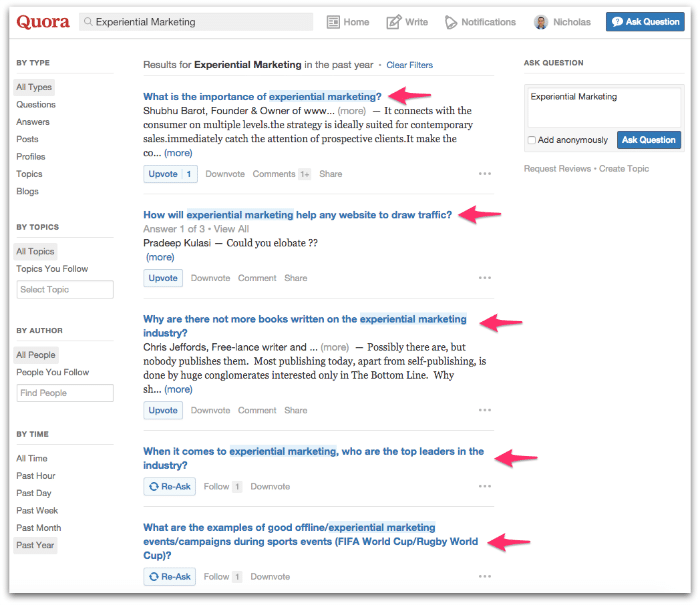
Coming up with a great idea for your next blog post is not easy. Sure, you could write about some plain, boring old subject that you know really well, but that’s not going to get any traction.
What you need is a system that allows you to discover the best blog topic ideas before you even write the first word.
In this article, I’ll share three specific, actionable tactics you can start using today to generate compelling and relevant blog ideas that resonate with your specific audience.
Ready, set, go!
1. Start with Google Trends
You have a niche, right? If not, that’s going to be your starting point. If you want your blog to stand out, you need to be very specific about what you write about. So for starters, you need to figure out your target market and how you can best serve them. It’s better to be too narrow than too broad.
If you need help with this, a good starting point is to develop a positioning statement. You can read more about that process here.
Okay, now we’re ready to figure out what is trending in your niche…
For this, I like to use Google Trends.
Start by plugging in a broad keyword or phrase into Google Trends. You need to start with something general here. We’re going to narrow it down in a minute.
For this example, since I blog about marketing, I’m going to type in “marketing.” Duh.
Then, refine the search results by selecting a region, time range, and category. I recommend going with 30 or 90 days and no longer. After all, we’re trying to find what’s hot right now, not last year.
Once you’ve done this, the data you really want is near the bottom. Look for a section called “Related Searches.”
Sometimes, Google won’t have enough search volume to show results. That’s okay. What we’re primarily after is the “Queries” column anyway.
One last step here. It is important that you select “Rising” instead of “Top.”
If you’re curious about the difference between these two choices, here’s how Google defines “rising” queries:
Rising searches are terms that were searched for with the term you entered (or overall, if no keyword was entered), which had the most significant growth in volume in the requested time period. For each rising search term, you’ll see a percentage of the term’s growth compared to the previous time period. If you see “Breakout” instead of a percentage, it means that the search term grew by more than 5000%.
Getting back to our example for “marketing,” there is one phrase in this list that really catches my attention in the list of rising queries:

See it? Experiential marketing. What the heck is that? Sounds trendy, doesn’t it?
Here’s a definition from Creative Guerrilla Marketing:
Experiential marketing is a form of advertising that focuses primarily on helping consumers experience a brand.
While traditional advertising (radio, print, television) verbally and visually communicates the brand and product benefits, experiential marketing tries to immerse the consumers within the product by engaging as many other human senses as possible. In this way, experiential marketing can encompass a variety of other marketing strategies from individual sampling to large-scale guerrilla marketing.
This topic had not been on my radar until now. Since Google Trends tells me it is rising in popularity, it might make for a good blog post that can stand out and rank well in search engines.
So now what?
2. Find popular articles with BuzzSumo
Once I have a nugget of an idea, I move over to BuzzSumo to dig a little deeper.
If you haven’t heard of BuzzSumo, it is a very powerful marketing tool that can help you analyze what content performs best for any topic or competitor.
Go to BuzzSumo, and search for your newly discovered trending keyword or phrase:

What I’m primarily looking for is the context in which our topic is being used in the most popular articles. Make sure you’re sorting by “Total Shares,” and then look for keywords in each article that tells you what the author is focusing on.
In this example, we see that the top article is all about examples of experiential marketing. People obviously want to see it in action.
Another popular post answers why experiential marketing is a worthwhile investment for brands.
And lastly, we have a popular post here that mentions experiential marketing software.
Armed with this info, I can now craft a decent list of topics and headlines based around experiential marketing.
So now, you should have a broad keyword from Google Trends, and a more specific collection of supporting keywords from BuzzSumo.
One more step, and we’re done!
3. Discover relevant questions with Quora
Last but not least, we want to make sure we’re covering all the bases when it comes to answering the right questions in our blog post. So we need to know which questions people are asking about a given topic.
To figure this out, I turn to Quora. You can find some very interesting questions here. It’s a good gauge of what people want to know about and how they’re asking for guidance.
Simply plug your trending keyword into Quora and see what comes up:

Make a list of the questions that catch your attention, that would fit into your blog post, and then be sure to answer them for your audience.
Sometimes, these questions will lead to others that aren’t listed here. This is just to get you thinking like your audience, so you know which way to approach your topic.
Falling back on my example, I would now try to combine the data from BuzzSumo and Quora to craft some very specific blog post topics. Here are a few that might work:
- 5 Brands Using Experiential Marketing to Dramatically Increase Site Traffic
- This Book Convinced Me to Invest in Experiential Marketing
- 10 Leaders in Experiential Marketing Share Their Favorite Tools
Try the same steps in your niche. You might be pleasantly surprised with what you can come up with.
Ready to get blogging?
Now that you know how to find trending topics in your niche, and how to turn them into compelling blog posts, the only thing left to do is to actually start writing. So grab some coffee and begin typing away!
Oh, and leave a comment below or on Twitter letting me know how these tactics work out for you. I’d love to hear about the interesting topics you come up with.
Happy blogging!





